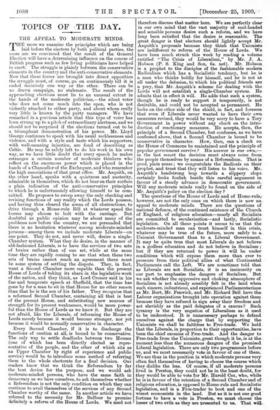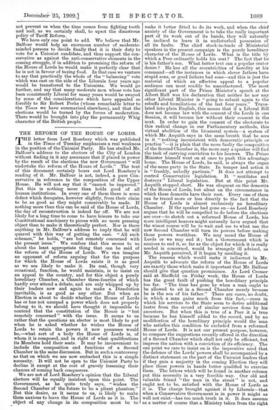TOPICS OF THE DAY.
THE APPEAL TO MODERATE MINDS: ri. more we examine the principles which are being laid before the electors by both political parties, the more are we convinced that the result of the General Election will have a determining influence on the course of British progress such as few living politicians have helped to exert. The struggle is plainly between the conservative elements in the country and the anti-conservative elements. Now that these forces are brought into direct opposition the struggle must, of course, go on continuously till it is ended decisively one way or the other. There can be no drawn campaign, no stalemate. The result of the approaching elections must lie to an unusual extent in the hands of the moderate politician,—the silent voter who does not come much into the open, who is not violently attached to either party, and about whom really very little is known by the party managers. We have remarked in a previous article that this type of voter has been strung up to a pitch of extraordinary alertness, and we should not be surprised if the elections turned out to be a triumphant demonstration of his power. Mr. Lloyd George continues to speak with his usual recklessness and violence, and with a style and taste which his supporters, with well-meaning injustice, are fond of describing as Celtic. He may be safely left to do his work in his own way, as we have little doubt that every speech he makes, estranges a certain number of moderate thinkers who reflect on the enormous power which is placed in the hands of a Chancellor of the Exchequer, and who remember the high associations of that great office. Mr. Asquith, on the other hand, speaks with a quietness and austerity, admirable in themselves, which do not bear on their surface a plain indication of the anti-conservative principles to which he is unfortunately allowing himself to be com- mitted. He proposes to sweep away the only checking and revising functions of any reality which the Lords possess, and having thus cleared the arena of all obstructions, to drive through a Home-rule Bill at whatever speed the horses may choose to bolt with the carriage. But doubtful as public opinion may be about many of the problems now before the country, we are persuaded that• there is no hesitation whatever among moderate-minded persons—among them we include moderate Liberals—on one point. They do not, and never will, desire a single- Chamber system. What they do desire, in the manner of old-fashioned Liberals, is to have the services of two sets of brains rather than of one set, while at the same time they are rapidly coming to see that when these two sets of brains cannot reach an agreement there must be some system of settling the dispute. They, in fact, want a Second Chamber more capable than the present House of Lords of taking its share in the legislative work of the nation, and they think, as Lord Cromer said in his fine and temperate speech at Sheffield, that the time has gone by for a man to sit in that House for no other reason than that he is the son of his father. They recognise that a reformed Second Chamber, containing all that is best of the present House, and substituting new sources of strength for its present weaknesses, would be more power- ful than the House of Lords as we know it. But they are not afraid, like the Liberals, of reforming the House of Lords merely because it would become stronger, nor yet because it would be normally conservative in character.
Every Second Chamber, if it is to discharge the functions of caution at all, is bound to be conservative. The only way to settle deadlocks between two Houses (one of which has been directly elected as repre- sentative of the people, and the other of which sits as an Upper Chamber by right of experience and public service) would be to introduce some method of referring them to the whole electorate for a final decision. Our readers know that we think- the Referendum by far the best device for the purpose, and we would ask moderate-minded persons, who have the same faith in democracy as we have ourselves, to ask themselves whether a Referendum is not the only condition on which they can continue to avail themselves of the services of any. Second Chamber worthy of the name. In another article we have, referred to the necessity for Mr. Balfour to promise definitely a reform of -the House of Lords. We need not therefore discuss that matter here. We are perfectly clear in our own mind that the vast majority of cool-headed and sensible persons desire such a reform, and we have long been satisfied that the desire is reasonable. The great danger is that electors should lightly accept Mr. Asquith's proposals because they think that Unionists are indifferent to reform of the House of Lords. We have been much struck this week by reading a volume entitled " The Crisis of Liberalism," by Mr. J. A. Hobson (P. S. King and Son, 6s.. net). Mr. Hobson . is a prophet to the disciples of the fashionable modern Radicalism which has a Socialistic tendency, but he _is a. man who thinks boldly for himself, and he is not at all under the delusion, to which his political friends are a prey, that Mr. Asquith's scheme for dealing with the Lords will not establish a single-Chamber system. He admits that in effect it will. He adds that such a system, though- he is ready to support it temporarily, is not desirable, and could not be accepted as permanent. He looks on the other side of the shield, in fact, and foresees that even if Liberals never wanted to have their own measures revised, they would be very sorry to have a Tory Government in power without any check on the intro- duction of reactionary measures. He accepts, then, the principle of a Second. Chamber, but confesses, as we have confessed above, that a Second Chamber is bound to be conservative in character. How, then, can a check on the House of Commons be maintained and the principle of popular government survive ? His answer is our own,— in the last resort the decision must always come from the people themselves by means of a Referendum. That is good, plain sense ; we congratulate the Radicals on their prophet, and trust that they will listen to his voice. Mr. Asquith's headstrong leap towards a slippery slope certainly looks foolish beside this careful argument in favour of a steady advance in democratic government. Will any moderate minds really be found on the side of Mr. Asquith's policy on the election day ?
The questions of the House of Lords and of Home-rulea however, are not the only ones on which there is now an appeal, to moderate minds. There are the questions of national defence, of the continued existence of the Church of England, of religious education—nearly all Socialists are committed to secularisation—and lastly, Socialistic legislation. On all these points it seems to us that the moderate-minded man can trust himself in this crisis, whatever may be true of the future, more safely to a. Unionist Government than to a Liberal Government. It may be quite true that most Liberals do not believe in a godless education and do not believe in Socialism ; but if they are returned to power it will be under conditions which will expose them more than ever to pressure from their political allies of what Continental Parliaments call the Left. We are sometimes told that as Liberals are not Socialists, it is an insincerity on our part to emphasise the dangers of Socialism. But we ask whether the oppressive and choking atmosphere of Socialism is not already sensibly felt in the land when such sincere, industrious, and experienced Parliamentarians as Mr. Burt, Mr. Fenwick, and Mr. Richard Bell have the Labour organisations brought into operation against them because they have refused to sign away their freedom and act slavishly as the paid delegates of a caucus ? Such tyranny is the very negation of Liberalism as it used to be understood. It is unnecessary perhaps to defend ourselves against the charge that by supporting the Unionists we shall be faithless to Free-trade. We hold that the Liberals, in proportion to their opportunities, have been the chief enemies of Free-trade. And the danger to Free-trade from the Unionists, great though it be, is at the Moment less than the numerous dangers of the promised Liberal legislation. There are only two programmes before us, and we must necessarily vote in favour of one of them. We are thus in the position in which moderate persons very often find themselves of having to choose the course which they dislike the less. Of course, if all moderate persons lived in Preston, they could not be in the least doubt, for they would be able to vote for Mr. Harold Cox, who, while he is in favour of the retention of a Second Chamber and of religious education, is opposed to Home-rule and Socialistic legislation, and is a Free-trader to boot and one of the wisest economists in the land. But as it is not our good fortune to have a vote in Preston, we must choose the lesser of two evils as they are presented to us. That will- not prevent us when the time comes from fighting tooth and nail, as we certainly shall, to upset the disastrous policy of Tariff Reform. We have only one point to add. We believe that Mr. Balfour would help an enormous number of moderate- minded persons to decide finally that it is their duty to vote for a Unionist candidate, and thus support the con- servative as against the anti-conservative elements in the coming struggle, if in addition to promising the reform of the House of Lords he would make it perfectly clear that he is not in favour of taxing food. In that case we venture to say that practically the whole of the " balancing " vote which was cast on the side of the Liberals four years ago would be transferred to the Unionists. We would go further, and say that many moderate men whose vote has been consistently Liberal for many years would. be swayed by some of the considerations which have appealed so forcibly to Sir Robert Perks (whose remarkable letter to the Times we have summarised elsewhere), and that the elections would be turned by the forces of moderation. There would be brought into play the permanently Whig character of the British people.



































 Previous page
Previous page